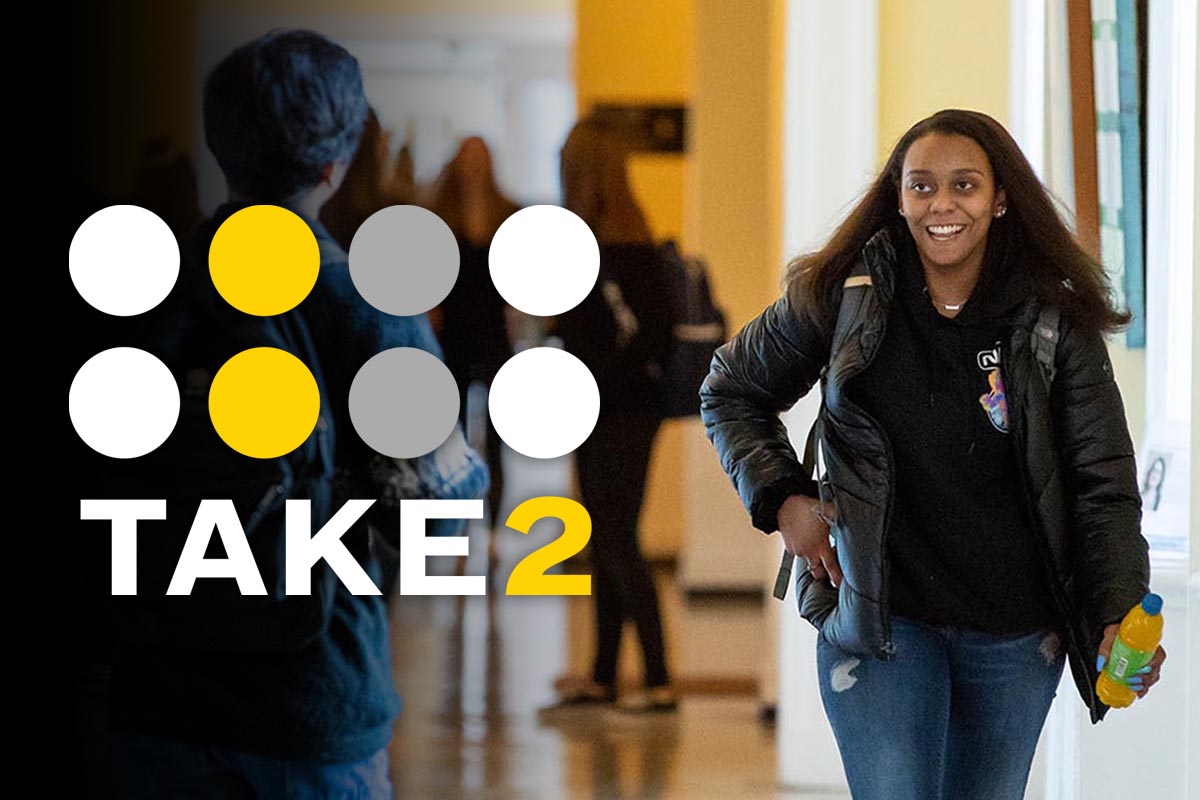Alumnae scientists share career experiences with students
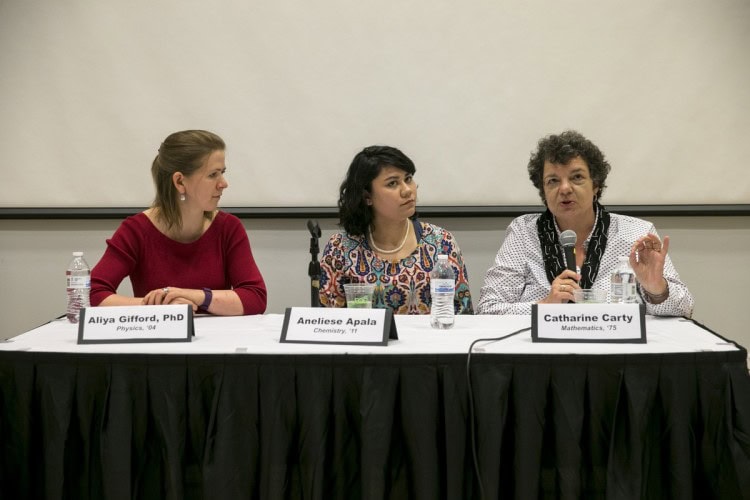
Catharine Smith Carty ’75 (right) speaks during the panel discussion.
Three alumnae scientists, Aneliese L. Apala ’11, Catharine Smith Carty ’75, and Aliya Gifford ’04, returned to Randolph College Friday afternoon to discuss their experiences and share advice with current students aspiring to enter careers in the sciences.
The Women in Science Panel discussion was part of Randolph’s 2016 Science Festival, which continues with events throughout the weekend, and the College’s 125th anniversary celebration.
Prior to the panel discussion in Nichols Theatre, the trio met one-on-one with students and other guests at a reception and open house at the Center for Student Research.
Aneliese L. Apala
Apala has worked for Pharmaceutical Product Development (PPD) for four years. PPD is a global contract research organization that provides services for all phases of drug development for pharmaceutical, biotechnology, academic, and government institutions. She began her career as an associate scientist in the chromatographic sciences department of PPD’s bioanalytical laboratory in Richmond, with a focus on small molecule pharmaceuticals. For the past two years, Apala’s focus has been on the isolation and quantification of biologics, or large molecule pharmaceuticals, by way of mass spectrometry.
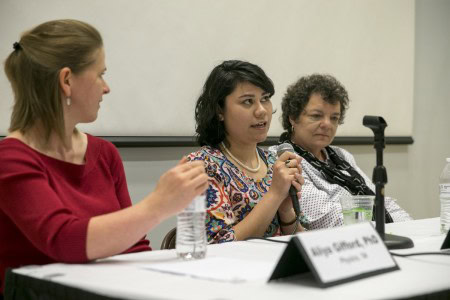
Aneliese Apala ’11 speaks during the panel discussion.
Apala said some of the most essential attributes to being successful in science are flexibility and being able to learn from mistakes. She joked that “being wrong a lot” was among her most helpful experiences at Randolph, and urged students to constantly ask questions.
“It’s okay to be wrong, but make sure you learn how to come back from mistakes,” she said.
When asked about challenges in the workforce, Apala said she had to overcome the stereotypes associated with being a woman in a male-dominated field, as well as being one of the youngest employees at the company. However, she enjoys her work because of the positive impact it has on people’s lives.
She stressed the importance of networking to Randolph seniors.
“Talk to people about what you should do next and take internships,” she said. “The main thing is, don’t be lazy.”
Catharine Smith Carty
A third-generation graduate of Randolph-Macon Woman’s College (R-MWC), Carty enjoyed a long, successful career in engineering, production and quality leadership, team development, and the global supply chain before retiring to become a nurse. While working as a psychiatric nurse in an acute inpatient setting, she began taking nurse practitioner courses in order to help her provide mental healthcare to rural Virginians.
Carty has also given her time and talents to the realm of education. She helped develop and teach the process technology curriculum for a Denver area community college, has guest lectured at James Madison University and the University of Virginia School of Business, and has judged the Virginia Junior Academy of Science and other K-12 science competitions.
Carty said succeeding in the field of science is “all about the ‘F’ word”—F standing for flexibility.
“You all are being trained here for careers that don’t exist yet,” she said. “This College challenges the way you think, and being challenged to think differently and adapt to changing times will prepare you for any career.”
Carty also advised students to turn to turn to their mentors for guidance.
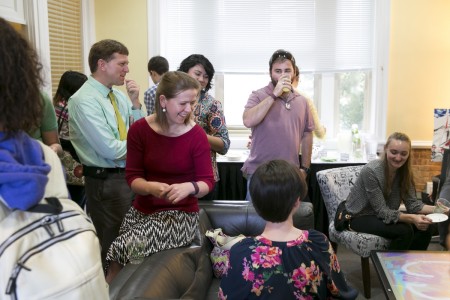
The panelists met with students in the Center for Student Research prior to the main event.
“You’re not going to accomplish anything in this life alone. Find someone who will give you honest feedback, and do that for others as well,” she said. “Most importantly, enjoy what you do. Don’t stress about what happens after you graduate. Just go and have fun.”
Aliya Gifford
A postdoctoral research fellow at Vanderbilt University, Gifford recently completed her doctoral degree in chemical and physical biology. She came to Vanderbilt after working as a research associate for two years at the Kennedy Krieger Institute (KKI) in Baltimore, Md.
At KKI, Gifford developed an interest in medical imaging, which she continued to study in her doctorate research on imaging and quantifying adult human brown adipose tissue. She currently guides the setup and launch of a new medical imaging study, as well as the development of custom software to automate the input, retrieval, and analysis of multimodality data.
Gifford said she discovered her interest in the analytics of healthcare while studying physics at R-MWC. She said the attributes she has relied on most for her career in science are tenacity and a perpetual curiosity. She also stressed the importance of writing skills in science careers.
“I couldn’t do what I do without oral communication and writing skills,” she said. “In a world of writing grant proposals, you have to know how to communicate your ideas and be convincing.”
Besides communication skills, Gifford said the extracurricular organizations in which she was involved at R-MWC gave her experience in working together with diverse groups of people. She is also grateful for Summer Research and other hands-on experiences she enjoyed at the College.
Above all, Gifford encouraged Randolph seniors to believe in themselves. “Jump in and do something when you graduate,” she said. “Get a job, work on your Ph.D., or volunteer. Don’t just sit on your couch for 72 days and watch Netflix.”
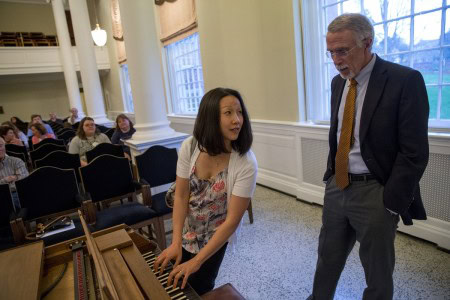
Music professor Emily Yap Chua tests a fortepiano with keynote speaker Nicholas Giordano.
Other Highlights of Science Festival 2016
Before Friday’s Women in Science Panel discussion, Randolph College’s 2016 Science Festival began on a high note Thursday evening, when Nicholas Giordano, dean of science and mathematics at Auburn University, delivered the keynote, “The Physics of the Piano.”
For his presentation, Giordano explored the physics behind playing the piano, how and why the first piano was constructed, and what can be learned about the popular instrument from an engineering perspective.
He explained that the first piano was invented in 1720s Florence, Italy by Bartolomeo Cristofori as an instrument that could be played in both loud (forte) and soft (piano) pitches. He also demonstrated the difference in pitch levels between the modern Steinway piano and its predecessors, the harpsicord and the fortepiano.
“Playing the piano is based on simple physics—the kinds of things you’d learn in your first physics class—but, if you look a little harder, you see effects that are more complicated than that,” Giordano said.
The musical theme at Randolph’s 2016 Science Festival continues this evening at 7 p.m. with a presentation entitled, “Spectral Visualization of Singing Voice Acoustics,” by Nicholas Perna, professor of voice pedagogy at Mississippi College. On Saturday at 7:30 p.m., Perna (tenor) and Mandy Spivak (soprano) will team up with Randolph music professor Emily Yap Chua for a Guest Artist/Faculty Recital. Both events will take place in Wimberly Recital Hall, inside Presser Hall.
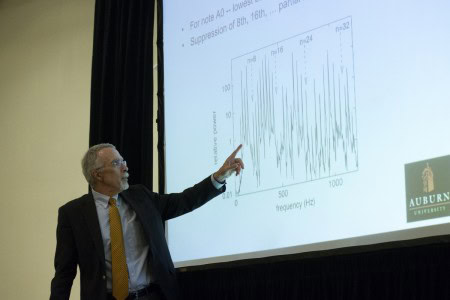
Nicholas Giordano delivers the lecture, “Physics of the Piano.”
Other Science Festival events this weekend include Science Day activities, a Junior FIRST LEGO League regional competition, and a petting zoo and bouncy houses. For the complete schedule, please visit http://randolphscience.org/scifest-2015-is-march-26-29/.
Tags: 125th anniversary, alumnae, alumnae accomplishments, Center for Student Research, music, outcomes, physics, science, science festival, successful alumnae